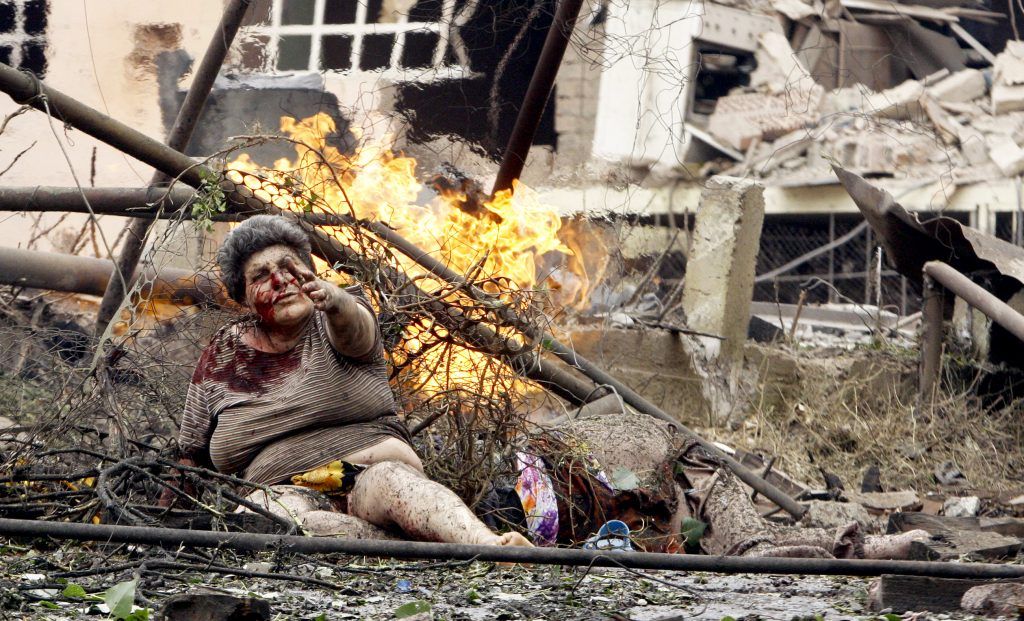In August 2008 Georgia fell victim to open military aggression by the Russian Federation that resulted in the illegal occupation of the Georgian regions Abkhazia and Tskhinvali region/South Ossetia. Russia’s large-scale military invasion in Georgia in blatant violation of fundamental norms and principles of international law served as a direct attack on European security and the international order. A few years later the same pattern was used against Ukraine.
Russia’s military invasion
Russian aggression against Georgia was premeditated and thoroughly calculated. Moscow had started preparation long before the actual war. In May-June 2008, the Kremlin started deploying railroad troops, military forces and offensive weaponry in Abkhazia region. These developments sharply escalated the situation on the ground. In the period just before the invasion, in July 2008, Russia conducted a large-scale military exercise, ‘Caucasus 2008’, near the Georgian border. Russian troops did not leave the area after the exercise was finished. Vladimir Putin himself did not try to hide the fact that the plan for military invasion existed about two years before the war.
Ten years ago the provocation started with massive attacks on Georgian-controlled villages by Russian-backed Ossetian volunteers who used machine guns and grenade launchers against the local civilian population. The escalation of the armed conflict was directly preceded by units of Russia’s 58 Army crossing the international border of Georgia through the Roki Tunnel on 7 August 2008. At the same time, Russian forces crossed the state border of Georgia into the Abkhazia region. With an artificial pretext of protecting the Russian citizens on Georgian soil (i.e the residents of Georgia who became victims of Russia’s illegal passpartsation), Moscow started a large-scale attack against the sovereign country via land, sea, air and cyberspace.
On 12 August 2008, the EU Presidency successfully mediated a ceasefire between Georgia and Russia. The Ceasefire Agreement laid a foundation for stopping Russia’s large-scale military aggression against Georgia.
However, despite continued calls from the international community, Russia has continued to violate the agreement. While Georgia has implemented all of the provisions of the ceasefire, Moscow has further reinforced its illegal military presence in both Georgian regions, destabilising the security environment in the whole of Europe. Following the military invasion, the Russian Federation recognised the so-called independence of Georgia’s occupied regions in gross violation of the fundamental norms and principles of international law, such as the inviolability of internationally recognised borders and territorial integrity of sovereign states.
Situation after 10 years
Ten years since its military aggression Russia still continues to illegally occupy 20 percent of Georgian territory. Moreover, Russia has intensified steps towards the factual annexation of Abkhazia and Tskhinvali region/South Ossetia, seeking full incorporation of Georgia’s indivisible regions into its military, political and economic systems in full disregard for international law.
For the past 10 years the security and human rights situation in Abkhazia and Tskhinvali region/South Ossetia, as well as in adjacent territories to the occupation line, has further deteriorated. The Russian Federation has been strengthening its illegal military presence on Georgian soil. In violation of the Ceasefire Agreement it holds a considerable number of military personnel in both regions. Russia’s illegal military bases in the Abkhazia and Tskhinvali regions are equipped with contemporary and sophisticated offensive weaponry.
Russia has also been provoking Georgia with its continuous fortification of the occupation line, employing barbed-wire fences and other artificial barriers to divide families and deprive the local population of access to their property and agricultural lands, healthcare and emergency services, as well as religious sites and cemeteries. Continuous illegal detentions and kidnappings along the occupation line have become another demonstration of grave human rights violations on the ground. Russia and its occupation regimes are making the lives of ethnic Georgians living in Abkhazia and Tskhinvali region/South Ossetia unbearable and there are no international mechanisms on the ground to effectively address these challenges.
Georgia’s peace policy
In response to all these concerning developments the Government of Georgia is trying to fully utilise peace negotiation formats to achieve tangible results for the lasting peace, security and human rights protection of the conflict-affected population on the ground. Georgia spares no effort in facilitating substantial negotiations in the Geneva International Discussions, a unique and inclusive format with co-chairmanship of the EU, UN, OSCE and participation of the US, established to duly address the security and humanitarian challenges stemming from the unresolved conflict between Georgia and Russia.
In addition, Georgia firmly pursues its co-operation with the EU Monitoring Mission (EUMM), which is the only international mechanism on the ground providing the international society with accurate information about the situation on the ground and violations of the 12 August 2008 Ceasefire Agreement by Russia. Although the EUMM has no possibility to enter the occupied regions and fully implement its mandate, the mission’s activities are decisive in preventing the escalation of tensions.
The Government of Georgia has introduced a new peace initiative, A Step to a Better Future, with the aim of improving the humanitarian and socio-economic conditions of people living in Abkhazia and Tskhinvali region/South Ossetia and fostering people-to-people interaction and confidence-building between the divided societies.
More specifically, the package seeks to enhance and simplify trade along the dividing lines, creating additional opportunities for quality education and access at every level of education, both at home and abroad. The initiative also envisages the creation of mechanisms for simplifying access to the benefits and services available to Georgia resulting from the country’s development and progress on its path to European integration.

















